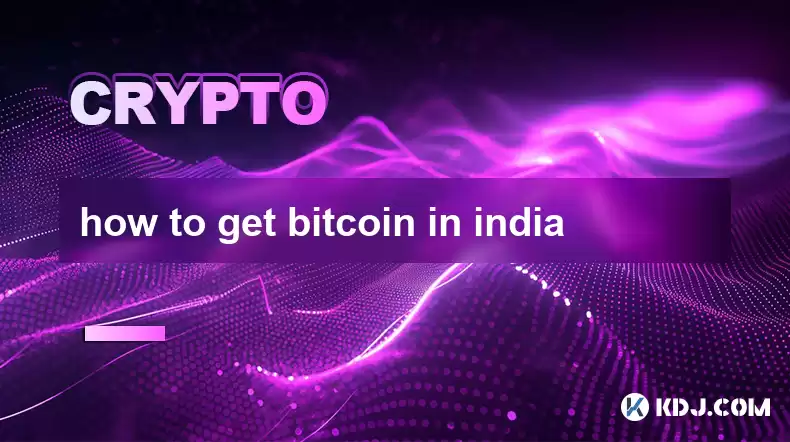-
 bitcoin
bitcoin $87959.907984 USD
1.34% -
 ethereum
ethereum $2920.497338 USD
3.04% -
 tether
tether $0.999775 USD
0.00% -
 xrp
xrp $2.237324 USD
8.12% -
 bnb
bnb $860.243768 USD
0.90% -
 solana
solana $138.089498 USD
5.43% -
 usd-coin
usd-coin $0.999807 USD
0.01% -
 tron
tron $0.272801 USD
-1.53% -
 dogecoin
dogecoin $0.150904 USD
2.96% -
 cardano
cardano $0.421635 USD
1.97% -
 hyperliquid
hyperliquid $32.152445 USD
2.23% -
 bitcoin-cash
bitcoin-cash $533.301069 USD
-1.94% -
 chainlink
chainlink $12.953417 USD
2.68% -
 unus-sed-leo
unus-sed-leo $9.535951 USD
0.73% -
 zcash
zcash $521.483386 USD
-2.87%
Comment obtenir le bitcoin en Inde
Buying Bitcoin in India requires navigating evolving regulations; reputable exchanges like WazirX and CoinDCX offer a centralized approach, while P2P platforms provide more flexibility but demand extra caution to avoid scams. Secure wallets are crucial for protecting your investment.
Mar 24, 2025 at 09:07 pm

Comment obtenir le bitcoin en Inde
L'acquisition de Bitcoin en Inde consiste à naviguer dans un paysage réglementaire qui évolue toujours. Bien qu'il ne soit pas explicitement interdit, il n'y a pas de cadre réglementaire officiel approuvant son utilisation. Cela signifie comprendre les risques et choisir des plateformes réputées est cruciale. Plusieurs méthodes existent, chacune avec ses avantages et ses inconvénients.
Méthodes pour obtenir le bitcoin en Inde:
- Échanges peer-to-peer (P2P): ces plates-formes connectent directement les acheteurs et les vendeurs. Vous pouvez parcourir les listes, sélectionner un vendeur et effectuer la transaction à l'aide de diverses méthodes de paiement comme UPI, les transferts bancaires ou même les espèces. Cela offre une flexibilité mais nécessite une diligence raisonnable pour éviter les escroqueries. Vérifiez soigneusement la réputation du vendeur avant de procéder.
- Échanges de crypto-monnaie: des échanges comme Wazirx, Coindcx et Zebpay opèrent en Inde. Ils fournissent une plate-forme centralisée pour acheter et vendre du bitcoin. Ces plateformes nécessitent généralement une vérification KYC (connaître votre client), qui consiste à fournir des informations personnelles à des fins de conformité. Les mesures de sécurité sur ces plates-formes varient, donc la recherche approfondie avant d'en sélectionner une.
- Bitcoin ATM: Bien que moins répandus que les autres méthodes, les distributeurs automatiques de billets Bitcoin sont disponibles dans certaines villes indiennes. Ces machines vous permettent d'acheter du bitcoin en utilisant de l'argent. Cependant, ils facturent souvent des frais plus élevés par rapport aux échanges en ligne. Vérifiez toujours la légitimité et la réputation du guichet automatique avant de l'utiliser.
Comprendre le processus:
Quelle que soit la méthode choisie, le processus de base implique ces étapes:
- Choisissez une plate-forme: sélectionnez un échange P2P, un échange de crypto-monnaie ou un bitcoin ATM en fonction de votre préférence et de votre tolérance au risque. Revues de recherche et mesures de sécurité avant de s'engager.
- Créez un compte: enregistrez un compte sur votre plate-forme choisie. Cela nécessite généralement de fournir des détails personnels et de vérifier votre identité via les procédures KYC.
- Financement de votre compte: Déposez les fonds dans votre compte en utilisant les méthodes de paiement acceptées (par exemple, transfert bancaire, UPI, Cash). Les frais peuvent s'appliquer.
- Achetez Bitcoin: passez une commande pour le montant souhaité de Bitcoin. Le taux de change fluctuera en fonction des conditions du marché.
- Sécurisez votre Bitcoin: une fois acheté, transférez votre Bitcoin dans un portefeuille sécurisé. Ceci est crucial pour protéger votre investissement contre les hacks potentiels ou les vulnérabilités de plate-forme. Les portefeuilles matériels offrent le plus haut niveau de sécurité.
Comprendre les réglementations indiennes:
La position du gouvernement indien sur la crypto-monnaie n'est actuellement pas définie. Bien qu'il ne soit pas explicitement illégal, il y a un manque de cadre réglementaire clair. La Reserve Bank of India (RBI) a précédemment émis des avertissements sur les risques liés à la négociation des crypto-monnaies. Par conséquent, il est essentiel de rester à jour sur les développements réglementaires et de procéder avec prudence. Des implications fiscales existent également, alors consultez un fiscaliste pour obtenir des conseils.
Choisir un portefeuille sécurisé:
Une étape cruciale consiste à choisir un portefeuille sécurisé pour stocker votre Bitcoin. Plusieurs options existent:
- Portefeuilles logiciels: Ce sont des applications installées sur votre ordinateur ou votre smartphone. Ils offrent une commodité mais nécessitent des pratiques de sécurité robustes pour empêcher un accès non autorisé.
- Portefeuilles matériels: Ce sont des appareils physiques conçus pour stocker vos clés privées hors ligne. Ils sont généralement considérés comme l'option la plus sécurisée, offrant une protection solide contre le piratage et les logiciels malveillants.
- Portefeuilles en papier: Ceux-ci impliquent l'impression de vos clés publiques et privées sur le papier. Bien que sécurisés hors ligne, ils sont sensibles aux dommages physiques ou aux pertes.
Gestion des risques:
Investir dans Bitcoin implique des risques importants. Le marché des crypto-monnaies est très volatile et les prix peuvent fluctuer considérablement en courte période. Avant d'investir, considérez votre tolérance au risque et n'investissez que ce que vous pouvez vous permettre de perdre. N'investissez jamais en fonction du battage médiatique ou de la spéculation. Diversifiez votre portefeuille pour atténuer les risques.
Questions courantes:
Q: Le bitcoin est-il légal en Inde?
R: Bitcoin n'est pas explicitement illégal en Inde, mais il n'y a pas de cadre réglementaire clair régissant son utilisation. La RBI a précédemment émis des avertissements sur ses risques.
Q: Quels sont les moyens les plus sûrs d'acheter le bitcoin en Inde?
R: Les échanges de crypto-monnaie réputés qui mettent en œuvre des mesures de sécurité robustes et les procédures KYC sont généralement considérés comme plus sûrs que les échanges P2P, qui comportent un risque plus élevé d'escroqueries. Les portefeuilles matériels offrent le stockage le plus sécurisé.
Q: Y a-t-il des taxes sur le bitcoin en Inde?
R: Oui, il y a des implications fiscales associées à l'achat, à la vente ou à la négociation de Bitcoin en Inde. Consultez un fiscaliste pour des conseils spécifiques. L'impôt sur les gains en capital peut s'appliquer aux bénéfices tirés à partir du trading du bitcoin.
Q: Qu'est-ce que la vérification KYC?
R: KYC (Connaissez votre client) La vérification est un processus où vous fournissez des documents d'identification personnels pour se conformer aux exigences réglementaires. La plupart des échanges de crypto-monnaie obligent la vérification de KYC.
Q: Qu'est-ce qu'un portefeuille Bitcoin?
R: Un portefeuille Bitcoin est un programme logiciel ou matériel qui stocke vos clés privées, vous permettant d'envoyer et de recevoir Bitcoin. Le choix d'un portefeuille sécurisé est crucial pour protéger votre investissement.
Q: Quels sont les risques d'investir dans Bitcoin?
R: Le prix de Bitcoin est très volatil, et le marché est sensible aux bulles spéculatives et aux baisses de prix soudaines. Il existe également un risque de perdre votre bitcoin par le piratage ou les vulnérabilités de la plate-forme.
Q: Comment puis-je éviter les escroqueries lors de l'achat de Bitcoin en Inde?
R: Tenez-vous aux échanges réputés et aux plates-formes P2P avec des profils de vendeurs vérifiés et des critiques positives. Méfiez-vous des promesses irréalistes ou des prix inhabituellement bas. Ne partagez jamais vos clés privées avec personne.
Q: Quels sont les frais impliqués dans l'achat de Bitcoin en Inde?
R: Les frais varient en fonction de la plate-forme et du mode de paiement utilisé. Les échanges facturent généralement des frais de trading, tandis que les transactions P2P peuvent impliquer des frais supplémentaires en fonction des conditions du vendeur. Les distributeurs automatiques de bitcoins ont également souvent des frais plus élevés.
Clause de non-responsabilité:info@kdj.com
Les informations fournies ne constituent pas des conseils commerciaux. kdj.com n’assume aucune responsabilité pour les investissements effectués sur la base des informations fournies dans cet article. Les crypto-monnaies sont très volatiles et il est fortement recommandé d’investir avec prudence après une recherche approfondie!
Si vous pensez que le contenu utilisé sur ce site Web porte atteinte à vos droits d’auteur, veuillez nous contacter immédiatement (info@kdj.com) et nous le supprimerons dans les plus brefs délais.
-
 RAIN Échangez maintenant
RAIN Échangez maintenant$0.007852
113.00%
-
 PIPPIN Échangez maintenant
PIPPIN Échangez maintenant$0.06097
51.96%
-
 PARTI Échangez maintenant
PARTI Échangez maintenant$0.1396
42.04%
-
 WAVES Échangez maintenant
WAVES Échangez maintenant$0.9141
41.69%
-
 ARC Échangez maintenant
ARC Échangez maintenant$0.04302
35.73%
-
 HONEY Échangez maintenant
HONEY Échangez maintenant$0.01029
21.80%
- Bitcoin fait face à une crise d'identité alors que les spéculateurs affluent vers les marchés de prédiction et les options ultra-courtes
- 2026-02-02 00:30:06
- MGK et Jelly Roll rendent hommage à Ozzy Osbourne au gala pré-Grammy, suscitant la frénésie des fans
- 2026-02-02 00:50:02
- Super Bowl Coin Flip : découvrir le pouvoir de prédiction de pile ou face
- 2026-02-02 01:30:01
- Le prix du Litecoin franchit le plancher de 9 ans au milieu d'un effondrement du marché : quelle est la prochaine étape pour l'OG Crypto ?
- 2026-02-02 01:20:02
- Actualités crypto, marchés des crypto-monnaies, dernières mises à jour : un début à l’envers jusqu’en 2026
- 2026-02-02 01:15:01
- Minute de New York : la prévente LivLive s'enflamme, tandis que Solana navigue sur des eaux agitées
- 2026-02-02 01:15:01
Connaissances connexes

Quelle est la réserve totale de Bitcoin ?
Oct 10,2025 at 01:55pm
Offre totale de Bitcoin 1. L'offre totale de Bitcoin est plafonnée à 21 millions de pièces. Cette limite est codée en dur dans le protocole Bitcoi...

Pouvez-vous acheter une fraction de Bitcoin ?
Oct 10,2025 at 06:01pm
Comprendre la propriété fractionnée Bitcoin 1. Oui, vous pouvez acheter une fraction de Bitcoin. La plus petite unité de Bitcoin s'appelle un sato...

Comment acheter Bitcoin pour la première fois ?
Oct 21,2025 at 11:00am
Comprendre Bitcoin et sa valeur 1. Bitcoin est une monnaie numérique décentralisée qui fonctionne sur un réseau peer-to-peer sans avoir besoin d'i...

Pourquoi Bitcoin est-il considéré comme une technologie révolutionnaire?
Aug 12,2025 at 08:29pm
Décentralisation et élimination des autorités centrales L'innovation principale derrière Bitcoin réside dans son architecture décentralisée , qui ...

Pourquoi Bitcoin est-il considéré comme une technologie révolutionnaire?
Aug 10,2025 at 07:42pm
Architecture décentralisée et transactions sans confiance Bitcoin est considéré comme révolutionnaire car il a introduit une architecture décentralisé...

Quelles sont les principales caractéristiques de Bitcoin?
Aug 10,2025 at 02:50am
Décentralisation et réseau entre pairs L'une des caractéristiques les plus déterminantes de Bitcoin est sa nature décentralisée . Contrairement au...

Quelle est la réserve totale de Bitcoin ?
Oct 10,2025 at 01:55pm
Offre totale de Bitcoin 1. L'offre totale de Bitcoin est plafonnée à 21 millions de pièces. Cette limite est codée en dur dans le protocole Bitcoi...

Pouvez-vous acheter une fraction de Bitcoin ?
Oct 10,2025 at 06:01pm
Comprendre la propriété fractionnée Bitcoin 1. Oui, vous pouvez acheter une fraction de Bitcoin. La plus petite unité de Bitcoin s'appelle un sato...

Comment acheter Bitcoin pour la première fois ?
Oct 21,2025 at 11:00am
Comprendre Bitcoin et sa valeur 1. Bitcoin est une monnaie numérique décentralisée qui fonctionne sur un réseau peer-to-peer sans avoir besoin d'i...

Pourquoi Bitcoin est-il considéré comme une technologie révolutionnaire?
Aug 12,2025 at 08:29pm
Décentralisation et élimination des autorités centrales L'innovation principale derrière Bitcoin réside dans son architecture décentralisée , qui ...

Pourquoi Bitcoin est-il considéré comme une technologie révolutionnaire?
Aug 10,2025 at 07:42pm
Architecture décentralisée et transactions sans confiance Bitcoin est considéré comme révolutionnaire car il a introduit une architecture décentralisé...

Quelles sont les principales caractéristiques de Bitcoin?
Aug 10,2025 at 02:50am
Décentralisation et réseau entre pairs L'une des caractéristiques les plus déterminantes de Bitcoin est sa nature décentralisée . Contrairement au...
Voir tous les articles










































































